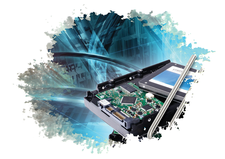Managing SSD tools with TKperf
No Detour

TKperf combines several SSD tools under one roof. You can use TKperf to investigate SSDs before deployment and even to measure performance.
Linux offers several low-level tools for investigating solid state drives (SSDs). Admins are well advised to deploy these tools immediately, because they overwrite all data, which is a problem for SSDs in production use. One example of an SSD tool is FIO [1], an I/O-benchmarking application by Jens Axboe. Upon request, FIO bypasses the Linux page cache, starts multiple jobs in parallel, and runs with different I/O depths and workloads.
The tool can even claim Linus Torvalds' blessings. "It does things right, including writing actual pseudo-random contents, which shows if the disk does some "de-duplication" (aka "optimize for benchmarks)," Torvalds posted on Google Plus in 2012. "Anything else is suspect – forget about bonnie or other traditional tools," he added.
Hdparm [2] is also an old friend that can set and read parameters on (S)ATA hard disk drives; recent versions of Hdparm even support SSDs. Hdparm is capable of obtaining information about SSDs, and it also has a secure erase feature that erases the contents of the pages.
[...]
Buy this article as PDF
(incl. VAT)
Buy Linux Magazine
Subscribe to our Linux Newsletters
Find Linux and Open Source Jobs
Subscribe to our ADMIN Newsletters
Support Our Work
Linux Magazine content is made possible with support from readers like you. Please consider contributing when you’ve found an article to be beneficial.

News
-
Linux Mint 22.3 Now Available with New Tools
Linux Mint 22.3 has been released with a pair of new tools for system admins and some pretty cool new features.
-
New Linux Malware Targets Cloud-Based Linux Installations
VoidLink, a new Linux malware, should be of real concern because of its stealth and customization.
-
Say Goodbye to Middle-Mouse Paste
Both Gnome and Firefox have proposed getting rid of a long-time favorite Linux feature.
-
Manjaro 26.0 Primary Desktop Environments Default to Wayland
If you want to stick with X.Org, you'll be limited to the desktop environments you can choose.
-
Mozilla Plans to AI-ify Firefox
With a new CEO in control, Mozilla is doubling down on a strategy of trust, all the while leaning into AI.
-
Gnome Says No to AI-Generated Extensions
If you're a developer wanting to create a new Gnome extension, you'd best set aside that AI code generator, because the extension team will have none of that.
-
Parrot OS Switches to KDE Plasma Desktop
Yet another distro is making the move to the KDE Plasma desktop.
-
TUXEDO Announces Gemini 17
TUXEDO Computers has released the fourth generation of its Gemini laptop with plenty of updates.
-
Two New Distros Adopt Enlightenment
MX Moksha and AV Linux 25 join ranks with Bodhi Linux and embrace the Enlightenment desktop.
-
Solus Linux 4.8 Removes Python 2
Solus Linux 4.8 has been released with the latest Linux kernel, updated desktops, and a key removal.

